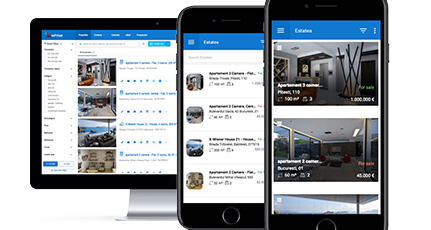There are about 24 million eCommerce websites around the world today (source: 99firms), and by 2022, global eCommerce companies’ revenue is predicted to reach more than $6 trillion (source: Statista). That’s pretty encouraging for every entrepreneur who intends to extend his existing eCommerce business or even migrate his offline business and start having an online presence.
In order to articulate why is so important to sell your products through your own online store, in this article you’ll find an in-depth analysis about:
Market’s main trends:
-
- The number of Internet users is increasing rapidly: As of January 5, 2020, there were 4,437,215,927 (4+ billion) internet users spanning the globe. This is compared to the 3.42 billion users recorded at the end of 2016. (Website Hosting Rating Stats);
- The customers’ interest in offline buying decreased: Only 23% of consumers said they prefer visiting shops to enjoy the shopping experience. (KPMG);
- Despite the GDPR’s rules, customers look for personalized experiences based on their data: 56% of consumers are willing to share data to receive faster and more convenient service. (Salesforce);
- Mobile is top of mind when it comes to internet access: 62% of users accessed the internet using their mobile phones. (Quoracreative).
First step: what approach suits you best: popular Marketplace (e.g., eBay, Amazon) or developing your own online store?
Popular Marketplace:
Pros
- initial costs are low;
- fast access to anyone;
- an opportunity to test a business/product;
- access to an existing/on growing audience;
- allow some customizations.
Cons
- high transaction fees;
- high immediate competition;
- low brand visibility;
- short-term customer relationship;
- limited business growth opportunities;
- limited brand identity tools;
- good for selling on price rather than quality.
Your Own Online Store:
Pros
- fast returns on investments;
- no transaction fees;
- real opportunities to market products based on quality;
- no immediate competition;
- professional design.
Cons
- not a suitable option for (very) small businesses.
If you’ve just begun testing the eCommerce industry or managing a small online business (a B2C based on low-priced products), probably the Marketplace approach responds better to your needs.
On the other hand, if you intend to develop a stable online business and try to gain the customers’ trust through a long-term strategy, having your own online store will be the best approach to turn your goals into reality.
What are the challenges for managing an online shop (what business owners must do vs what customers really need)
The main concerns for business owners when it comes to managing an online shop are usually related to the costs, context, profitability, and to the way they should select their tools (platforms, apps, CMS, CRM, etc.) to simplify their work and increase productivity.
These concerns are doubled by the dynamic evolution of online consumer behavior.
The market’s trends show that today’s customers’ are more educated in using the internet and purchasing online and that their expectation for a complete and personalized experience is higher than ever:
- 75% of consumers are more likely to buy from a retailer that recognizes them by name, recommends options based on past purchases, OR knows their purchase history (Accenture);
- Over 60% of consumers take the time to review a return policy before making a buying decision (ReadyCloud);
- Having the most competitive price won’t guarantee a sale, the next key attributes were enhanced delivery options and easy return policies. (KPMG)
Based on this context, here come some questions: is it enough to have an online shop to generate a relevant volume of sales? And if you manage an offline store – what should you do next to keep your business alive and profitable?
Challenges for an online business owner
- to optimize his existing website for better performance and user experience;
- to get valuable insights for delivering relevance (up-selling, cross-selling);
- to stand out on the crowded market and have a well-defined brand identity;
- to have clear and reliable policies for deliveries, return, and service;
- to have relevant stocks available and sell relevant products only;
- to develop long-term relationships with his customers;
- to have good control over the orders based on his customers’ previous behavior;
- to use smart and engaging tools (e.g., apps) to keep customers close to his business.
Challenges for an offline business owner
- to migrate his activities online;
- to create a powerful and engaging website;
- to automate time-consuming tasks;
- to develop an online strategy based on relevant insights;
- to convince his existing (offline) customers to buy online;
- to smartly promote his products on the market;
- to communicate his offers to his existing customers;
- to develop clear and reliable policies for deliveries, return, and service;
- to organize and manage his stocks and promote only relevant products;
- to use smart and engaging tools (e.g., apps) to keep customers close to his business.
What customers need and expect
- intuitive and personalized experience;
- fair pricing for products;
- transparent policies for deliveries, return, and service;
- responsiveness and relevance on-site and apps;
- multichannel offers’ availability;
- optimized offers for the cross-device journey.
Get in touch with our software consultant to find out how we can help you adapt to the market’s trends.
Top solutions for an online store
E-COMMERCE TECHNOLOGY: It’s not enough to use an eCommerce platform. It’s also very important to choose the right one (powerful and reliable) and select only those solutions that suit best to your business. For instance, we are usually using Magento 2 for our clients’ website:
- user-friendly catalog and content management;
- secure and regularly updated;
- free to use (Community Version);
- mobile-friendly interface;
- SEO, marketing and promotion tools;
- the largest community, a lot of modules already developed.
UX DESIGN FOR YOUR SITE – to deliver the best shopping experience for your customers. If a visitor doesn’t find what he is looking for on your site, he will leave it in less than 15 seconds.
ONLINE PAYMENT SOLUTIONS INTEGRATED INTO A WEBSITE Performant online payment solutions are crucial if you intend to manage a high volume of sales.
THIRD-PARTY INTEGRATION OF ERP AND CRM SOFTWARE You need performant data and processes management to simplify your activities and have access to valuable insight that could help you increase sales.
INTEGRATED SOCIAL NETWORK APIS INTO THE E-COMMERCE SOLUTIONS By putting together the announced trends and the unexpected ones, you’ll realize that you must have a multichannel presence and communication. That’s why it is so important to integrate social network APIs into your site smartly.
INTEGRATED SPECIFIC APPS, FEATURES, AND FUNCTIONALITY (e.g., tracking, managing stocks, ) Each industry / each business has specific needs, one more reason to take into account developing specific features for your eCommerce site.
All the solutions above are essential for every online business, that’s for sure. But you and your staff may not have the technical background for covering these business needs. Or, maybe you have it, but you don’t want to lose focus on core activities by handling a new project. And, besides this, you are aware that these solutions should not be implemented disparately.
So, what you really need is an end-to-end eCommerce solution, able to integrate all the features, apps, and functionalities your business needs. And a complete solution for your online store can be delivered by a reliable, experienced DEDICATED TEAM.
CASE STUDY Porsche Bank: one-stop-shop solutions for selling products and services
The client needed to develop one-stop-shop solutions for selling products and services (financing, insurance, maintenance).
This approach is a premiere for the Romanian market offering dynamic and intuitive features.
Technology
The project is based on Magento2 with a totally custom designed interface. We developed a REST API and a custom Magento module for doing the financial precheck of the customer.
Website features and functionality
- Showing detailed information;
- Calculating the credit rates on the fly;
- Advanced financial pre-check algorithms;
- Paying a reservation fee online.
Start developing a smart and complete eCommerce solution for your business.
Get in touch with our software specialist to see what suits best to your company’s needs.




